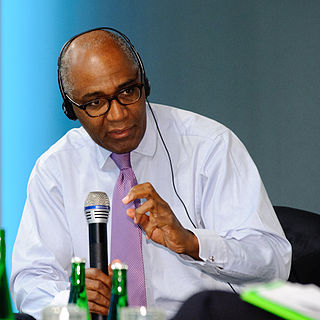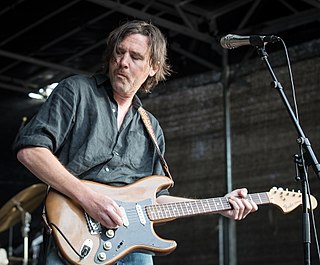A Quote by Irvine Welsh
It's the UK: We have to get beyond that imperialist state. I think that kind of imperialist, hierarchical, elitist state has made it easier to basically shaft everybody in the country, which it's been doing for the last thirty years. It has also sort of made it more difficult for England to fulfill its destiny, which in my mind is creating a multi-ethnic, multicultural society that is truly at the head of that post-imperial commonwealth ideal. I think that that's what England should be and that that's the kind of nation we should be.
Quote Topics
Also
Basically
Been
Beyond
Commonwealth
Country
Creating
Destiny
Difficult
Doing
Easier
Elitist
England
Ethnic
Everybody
Fulfill
Get
Head
Ideal
Imperial
Imperialist
Kind
Last
Made
Made It
Mind
More
Multicultural
Multicultural Society
Nation
Post
Shaft
Should
Society
Sort
State
Think
Thirty
Thirty Years
Truly
UK
Which
Years
Related Quotes
in that small [time] most greatly lived this star of England: Fortune made his sword, By which the world's best garden he achiev'd And left it to his son imperial lord. Henry the Sixth, in infant bands crown'd King of France and England did this King succeed; Whose state so many of had the managing, That they lost France and made his England bleed.
The error of Socrates must be attributed to the false notion of unity from which he starts. Unity there should be, both of the family and of the state, but in some respects only. For there is a point at which a state may attain such a degree of unity as to be no longer a state, or at which, without actually ceasing to exist, it will become an inferior state, like harmony passing into unison, or rhythm which has been reduced to a single foot. The state, as I was saying, is a plurality which should be united and made into a community by education
The breakdown of Plato's philosophy is made apparent in the fact that he could not trust to gradual improvements in education to bring about a better society which should then improve education, and so on indefinitely. Correct education could not come into existence until an ideal state existed, and after that education would be devoted simply to its conservation. For the existence of this state he was obliged to trust to some happy accident by which philosophic wisdom should happen to coincide with possession of ruling power in the state.
Education, and the life of the mind generally, is a matter in which individual initiative is the chief thing needed; the function of the state should begin and end with insistence on some kind of education, and, if possible, a kind which promotes mental individualism, not a kind which happens to conform to the prejudices of government officials.
Out of the chaos of post-Roman Dark Age Britain, the English had created the world's first nation-state: One king, one country, one church, one currency, one language and a single unified representative national administration. Never again in England would sovereignty descend to the merely regional level. Never again would the idea of England and the unity of England ever be challenged.
There is no magic. Harry Potter was probably the last one. There are no Harry Potters in politics. There are people who should be hard working, admit their mistakes - and we made a lot of mistakes - make an honest self-critic but change what we did wrong. What did we do wrong? We built a state which is big, which is corrupted, which is a state which should radically change. What is Mr Tsipras saying - keep it as it is, so everything that is old belongs to him.
I think there are a number of reasons, not least of which is the personality of the Queen [ Elizabeth II]. It's very easy to underrate her significance. I think she finds the Commonwealth and her position as Head of the Commonwealth infinitely more interesting than being the Queen of England, because she has no significant role in the latter.
I think there's an awful lot of noise about the Church being persecuted but there is a more real issue that the conventional churches face - that the people who are really driving their revival and success believe in an old-time religion which, in my view, is incompatible with a modern, multi-ethnic, multicultural society.
I think, for the good of the country and the fact that you don't want a question coming up every time there's a decision made, [Donald Trump] should basically take himself out of it and just be a passive participant in the sense that he has no decision-making, no involvement and no decisions get made separate from him. Which is the way the way it's done for more Cabinet offices. Or I think all Cabinet offices.
I don't think music is my job - I don't think about it that way, because I don't really get paid. There's not paycheck at the end; it's more of a "whatever is left over" kind of situation. Also, it keeps me from thinking about my creativity as a business, which it is not. It should remain pure; that's one of the reasons I made music in the first place.
I please myself with imagining a State at least which can afford to be just to all men, and to treat the individual with respect as a neighbor; which even would not think it inconsistent with its own repose if a few were to live aloof from it, not meddling with it, nor embraced by it, who fulfilled all the duties of neighbors and fellow-men. A State which bore this kind of fruit, and suffered it to drop off as fast as it ripened, would prepare the way for a still more perfect and glorious State, which also I have imagined, but not yet anywhere seen.
That historians should give their own country a break, I grant you; but not so as to state things contrary to fact. For there are plenty of mistakes made by writers out of ignorance, and which any man finds it difficult to avoid. But if we knowingly write what is false, whether for the sake of our country or our friends or just to be pleasant, what difference is there between us and hack writers? Readers should be very attentive to and critical of historians, and they in turn should be constantly on their guard.







































